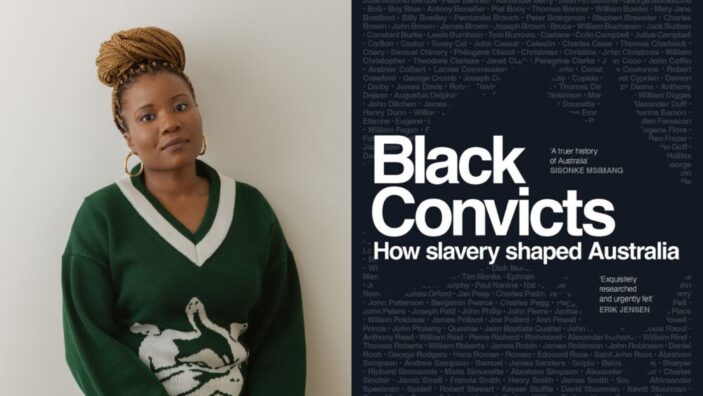
Every Australian knows something of the colonisation of Australia; of the ships that were sent and the convicts that arrived. But, there are some parts that are left out of the wider narrative, unnoticed or undiscussed in conversations about Australia’s history. It’s one such element that Santilla Chingaipe delves into in her latest book Black Convicts – those early imprisoned arrivals from Africa or with African ancestry, current or former slaves.
Delving into the archives and visiting the places some of these men and women were sent from and too, Chingiape tells the stories of these people often forgotten or ignored in the narrative of Australia. Exquisitely researched and passionately written, it’s a fascinating journey into the past – often sad, sometimes sweet – and a reflection on whose stories we tell.
Each chapter explores a handful of the titular black convicts, who are all tied together by some similar experience or era. One focuses on the first convicts who arrived – including those on the first fleet, whose rarely-discussed existence sparked Chingiape’s interest in writing this book in the first place. Another looks at those involved in the growing sugar industry, female convicts, rebels and more.
In many cases, what we know about these individuals is very little, save for a few lines in official records. But, where there is information the book dives into these stories, sharing their own words and those words said about them. These stories frequently involve injustice, bigotry and tragedy, and it never shies away from showing the darker parts of Australia’s history, or from acknowledging their complexity and the inadequacies of the records and written narratives created primarily by powerful white men. It’s a nuanced tale, told expertly.
Despite the seemingly huge number of black convicts sent to Australia, the focus on the stories we know makes the book seem rather personal. Though some of their journeys overlap and have similarities, others are very different from each other, presenting some rather unexpected narratives. At times it’s fascinating, offering a glimpse into the lives of these long-dead convicts in a way which feels intimate – it’s not just a dry re-telling of facts, but their stories.
At times Chingaipe also discusses their experience researching and writing the book, sharing the words of academics and at times even descendants of these black convicts. It’s a stark reminder that these are not just names on a page, and it’s an approach which makes this book feel all the realer.
To call this book just a chronicle of the lives of Australia’s black convicts would not be strictly accurate, however. At the heart of this book is an examination of racism and slavery and how these institutions were baked into our country from the very start. It explores the slave trade in the British empire, the way that African people and their descendants were treated before, during and after their transportation to Australia and the deceptive abolition of slavery. Alongside providing an explanation for the experiences of the stories told in the book, it serves to dissect the way that the systems of slavery made up the fabric of early Australia, and in some ways can still be felt today. It’s an angle which is rarely discussed here, but it’s an important one, one which is fascinating to read and is thought-provoking.
If you’re interested in learning more about Australian history, I can definitely recommend Black Convicts. This is a topic rarely discussed by other authors, and these stories are shared with such great skill and intensive research. It makes for a worthwhile read, and may just change the way you think about some aspects of our country’s past.
![]()
![]()
![]()
![]()
![]()
FOUR STARS (OUT OF FIVE)
Black Convicts by Santilla Chingaipe is available now from Scribner. Grab yourself a copy from your local bookstore HERE.
